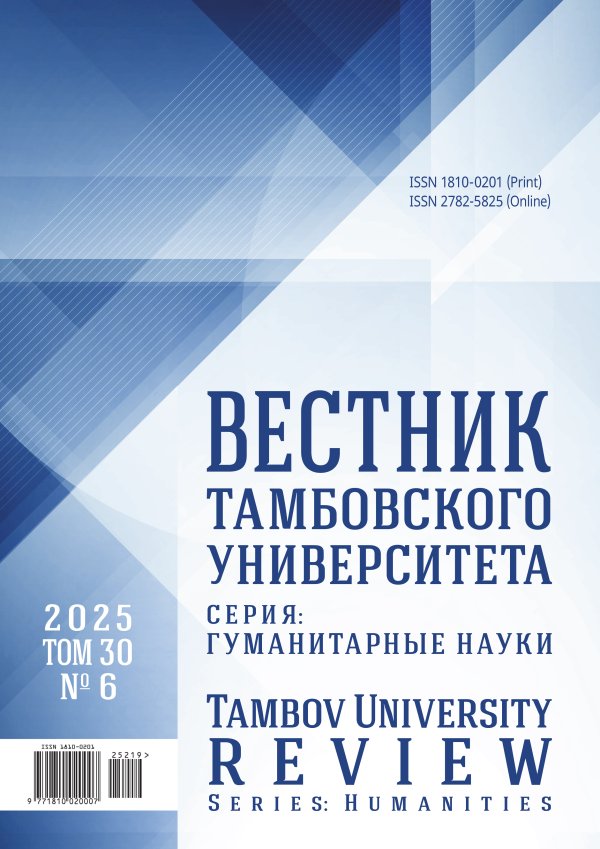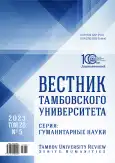Формирование памяти о Первой мировой войне через деятельность британских ветеранов и историческую политику Великобритании в 1930-е гг.
- Авторы: Инкин В.В.1
-
Учреждения:
- ФГБОУ ВО «Тамбовский государственный университет им. Г.Р. Державина»
- Выпуск: Том 28, № 5 (2023)
- Страницы: 1305-1315
- Раздел: ИСТОРИЯ ЗАРУБЕЖНЫХ СТРАН
- URL: https://journal-vniispk.ru/1810-0201/article/view/297937
- DOI: https://doi.org/10.20310/1810-0201-2023-28-5-1305-1315
- ID: 297937
Цитировать
Полный текст
Аннотация
Актуальность. Научная проблема заключена в изучении особенностей формирования исторической памяти о Первой мировой войне. Цель исследования – раскрыть, каково было соотношение влияния государства и ветеранов в формировании нарративов исторической памяти о Первой мировой войне в Великобритании 1930-х гг.Методы исследования. Историческая политика британского правительства в области памяти о Первой мировой войне была изучена историко-системным подходом для рассмотрения как одного из инструмента воздействия на общество Великобритании. Проанализирована деятельность ветеранских организаций и отдельных фронтовиков на протяжении 1930-х гг., чей протест против государственного нарратива исторической памяти после «Великой депрессии» стал сходить на нет к 1939 г.Результаты исследования. На основе материалов британской прессы 1930-х гг., а также привлечения дополнительных источников были проиллюстрированы нарративы о Первой мировой войне, которые постепенно менялись в 1930-х гг. Идеология и мероприятия государства в области исторической политики активно с 1932–1933 гг. вытесняли негативные представления о войне, подавляли антивоенные движения и пацифистские настроения в британском обществе. Усиление влияния государства на Британский легион свидетельствовало о его подчинении официальной повестке, что позволяло правящим кругам использовать ветеранов в реализации внутренней и внешней политике (развивать международные контакты, влиять на общественное мнение).Выводы. Значимость работы заключается во введении в научный оборот материалов британской прессы как исторических источников, которые позволяют отследить постепенное ослабление роли ветеранских организаций в области памяти о Первой мировой войны к середине 1930-х гг., и усиление влияния государства в этом отношении. Показано соотношение официального и общественного (ветеранского) нарративов в исторической памяти.
Ключевые слова
Об авторах
В. В. Инкин
ФГБОУ ВО «Тамбовский государственный университет им. Г.Р. Державина»
Автор, ответственный за переписку.
Email: vic-ink@yandex.ru
ORCID iD: 0009-0001-6840-9158
научный сотрудник кафедры истории и философии
392000, Российская Федерация, г. Тамбов, ул. Интернациональная, 33Список литературы
- Смирнова Т.А. Особенности изучения исторической памяти и практик коммеморации Первой мировой войны в Великобритании 1918–1939 г. // Ярославский педагогический вестник. 2014. № 4. Т. 1. С. 95-98. https://elibrary.ru/tfxqpb
- Ольштынский Л.И. Курс истории для бакалавров. Общие закономерности и особенности развития России в мировом историческом процессе. Уроки истории. М.: Логос, 2016. 408 с. https://elibrary.ru/zuylsb
- Урланис Б.Ц. Войны и народонаселение Европы: Людские потери вооруженных сил европейских стран в войнах XVII–XX вв. М., 1960. 567 с.
- Уинтер Дж. Места памяти, места скорби. Первая мировая война в культурной истории Европы / пер. с англ. А.В. Глебовской. СПб.: Изд-во Европейского ун-та в Санкт-Петербурге, 2022. 392 с.
- Гурович П.В. Английское рабочее движение накануне Второй мировой войны. М.: Наука, 1967. 359 с.
- Сапожникова Г.Н. Антивоенное движение в странах Европы в межвоенный период, 1917–1939. М.: Наука, 1985. 150 с.
- Parker J. King of Fools. N. Y.: St. Martin’s press, 1988. 312 p.
Дополнительные файлы









